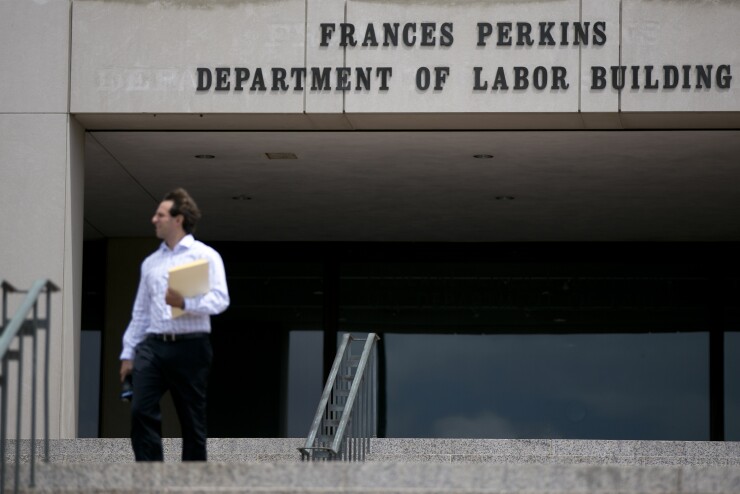WASHINGTON — Even if the Department of Labor loses or gives up the legal fight over its fiduciary rule, industry insiders say that the spirit of the regulation will live on.
The topic was much discussed at the Investment Adviser Association's annual compliance conference last week, after a federal appeals court issued a strongly-worded ruling
The rule now sits in legal limbo as another challenge in a Washington, D.C. court looms, and observers await how the Labor Department responds to its latest setback.
A spokesman for the DoL acknowledged that the court's ruling has stopped the rule in its tracks, but declined to comment on the department's legal strategy going forward.
"Pending further review, the department will not be enforcing the 2016 fiduciary rule," the spokesman said.
But regardless of the fate of the rule, the brokers who provide retirement advice have already taken steps to implement some of its provisions, including representing to clients that they will act in their best interests.
"Now, are you really going to send a letter to your clients saying, never mind I'm not going to act in your best interest? No. No, it's too late. So some of this is not going to change in real life," said Karen Barr, president and CEO of the IAA.
"Even if the DoL rule is vacated and gone, the horse is out of the barn," Barr said during a panel discussion at the IAA's event.
Conversely, if the Labor Department prevails in court and moves ahead with the more controversial second phase of the regulation, the exemptions to prohibited transactions nevertheless will remain broad, said Scot Draeger, general counsel and chief compliance officer at R.M. Davis, an RIA based in Portland, Maine. As a result, core fee and commission structures in the industry will likely remain intact.
"Brokerage industries and advisors will probably continue to be able to utilize most existing compensation arrangements in some form and with certain clients if they adopt certain anti-conflicts policies and procedures, along with much more robust and prominent transparent disclosure about those conflicts," Draeger said.
The enduring changes in compensation arrangements will more likely come around the margins, he added.
"Certain sources of revenue such as 12(b)-1 fees from particular share classes are the types of things that might die a slow death in the middle of this," Draeger said.

As to the legal matter, the immediate question looms of how the Labor Department will respond to its latest setback.
"The real wild card is what the DoL does now. The DoL under this administration has been defending the rule," Barr said. "So the question is: will they continue to defend the rule?"
The Labor Department has delayed the fiduciary rule’s effective date and signaled that it is open to rewriting the regulation to relax some of the more stringent provisions. Still, some observers
The Labor Department could either ask for a full hearing before all of the judges on the 5th U.S. Circuit Court of Appeals, or it could seek to bring the matter to the U.S. Supreme Court.
-
Merrill Lynch, UBS and others made considerable alterations to policies and procedures in order to be compliant with the Labor Department regulation.
March 19 -
Even after a federal appeals court struck down the rule, more clashes over the regulation of sales versus advice are inevitable.
March 19 -
The Department of Labor has an incentive to defend its rule-making authority even though it is considering revisions to the regulation.
March 16
The Supreme Court seems a likely final stop for the regulation, given the parallel case in the US. Court of Appeals for the D.C. Circuit. Even if the two lower courts rule in much the same manner, the high court might still need to iron out the wrinkles in those decisions, according to Draeger.
"It's anticipated that even if there is a concurring view, generally it's unlikely to completely overturn every element of the rule, and be distinguished in some particular way, so it's likely headed to the Supreme Court for a decision on what elements of the rule will survive," he said.
For many fee-only, independent RIAs, the Labor Department's rule didn't necessitate a wholesale rewrite of the firm's policies and procedures, Draeger observed. At his firm, as with many others, advisors were bound by a fiduciary duty before the DoL's rule, and they continue to operate under that standard.
"The true answer was it really doesn't change much at all for those of you who are RIAs, not dual registrants and primarily serving separately managed accounts," Draeger said.
One notable exception involves retirement account rollovers. Advisors previously could have fielded a general question from a prospective client about rolling over an employer-sponsored plan or a 401(k) plan without triggering their fiduciary responsibilities. But the DoL rule changed that.
"That's the one place where the rule picked up, continues to govern and likely will be governing in some form going forward," Draeger said. "All of a sudden your answer to that question then has to be considered in the context of your fiduciary role. That is new."
Advisors who have shifted their protocols to respond to that provision should essentially ignore the latest court ruling against the DoL rule, according to Barr, who notes the uncertain legal path ahead.
"Bottom line, we won't know for several weeks at least, so don't do anything differently based on this decision," Barr said.
"Stay tuned," said Draeger. "So much is in flux with respect to what the courts will say about it."





